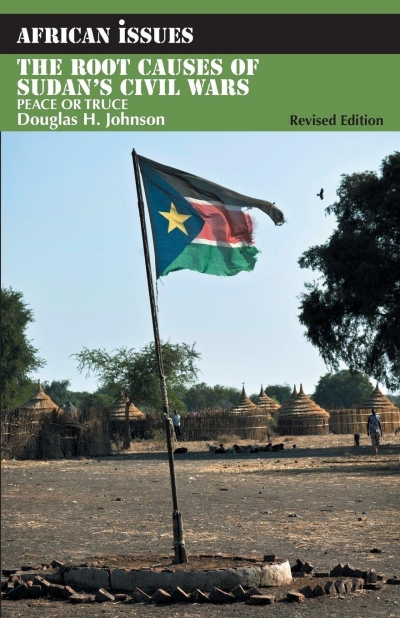



"The tiger is a dangerous animal." This sentence is simple, self-explanatory and straightforward. Any adult - or even a child beyond a very simple stage of development - understands what this statement means and knows to steer well clear of tigers. However, insert different nouns in the same very simple sentence - "the government of the United States is a shaytani buzurg (a giant Satan)", for example - and somehow the clarity of meaning disappears, at least for many leaders in the Islamic movement and politicians and officials in the Islamic State of Iran.
The Root Causes of Sudan’s Civil Wars by Douglas H. Johnson. Publisher: Indiana University Press, Bloomington and Indianapolis, 2004. Pp.: 234. Pbk: £12.95/$24.95. By Nasr Salem For outsiders and non-specialists, the on-going crisis in the province of Darfur, western Sudan, has brought to light the fact that the Sudan’s long-drawn-out predicament is made up not of one civil war but rather of several, sometimes interlocking, civil wars. If anything, elucidating the nature of these civil wars requires an understanding of the historical patterns that shaped inter-communal tensions for decades – and perhaps centuries – until they erupted into protracted civil strife. But internal wars often present outside players with opportunities to interfere in the affairs of countries mired in civil strife, and Sudan’s impasse has been no exception.
1The language people use to discuss political news stories reflects their understandings of the situations under discussion. In recent months, as the political institutions established in Iraq by the US have gradually taken shape, the language used in the world press has also changed. Where American authorities were once described as the effective rulers of Iraq, with Iraqi groups and their leaders described as political factions representing particular sectors of the community, since the elections in January this year they have been treated as national politicians, even though the flaws of the elections are widely recognised.
Accountability is supposed to be one of the cornerstones of democracy. Elections are the most fundamental element of this process: every few years, political leaders have to put themselves forward to the people for re-election, giving the people a chance to vote them out of office if they are not satisfied with their performance. In the parliamentary model of democracy that originates in.
Among the many comments made in the aftermath of the death of Pope John Paul II was that he was the first truly modern Pope. By this it was not meant that he was what Western commentators would regard as liberal and progressive, in line with the model for western-style modernisation generally demanded of Muslim societies: he was in fact regarded as a voice of conservatism and tradition by those who favour the marginalization of moral values and the general secularization of society.
This month - Rabi al-Awwal in the Hijri calendar - sees celebrations of the birth of the Prophet (saw) all over the Muslim world. In this article, ZAFAR BANGASH, Director of the Institute of Contemporary Islamic Thought (ICIT), discusses some key elements of the Seerah.
Education is a central part of the West’s agenda for re-shaping the Muslim world along its own lines. As such, it plays a prominent role in the many institution as and programs by which the West aims to persuade Muslims to acquiese to their own Westernization, writes YUSUF AL-KHABBAZ.
Officially, suspension of armed operations by both the Israeli occupation forces and popular resistance forces in Palestine is holding and there is progress, albeit slow and halting, in the general direction of a future political settlement.
Judicial, media and student agencies are for the first time staging public protests against the autocratic rule of president Husni Mubarak to an extent that makes the recent challenges by political opposition groups, including the Ikhwan al-Muslimeen (Muslim Brotherhood), mild by comparison
The rising tide of public corruption in Algeria – an issue that was never the centre of concern before – has now forced the regime to address it. The senior military officers who have really ruled the country since its independence in 1962, and the civilian politicians who have been a cloak for them, have focused their attention on fighting Islamic groups, rather than controlling a practice that they obviously benefit from.
Can the US be a friend of the Muslims? This is not a rhetorical question; Muslims must consider it seriously because it has enormous implications for their future. First, a clarification is in order: when one talks about “the US”, one does not mean the American people but the government, although it could be argued that the 51 percent of Americans who voted for George Bush should bear some responsibility for the crimes perpetrated in their name.
Since his release last year after spending six-years in a Malaysian prison, Anwar Ibrahim has become a darling of the West for his promotion of an understanding of Islam that is regarded as ‘moderate’ and West-friendly. ABDAR RAHMAN KOYA in Kuala Lumpur reports.
The United States, which last September accused Sudan of committing genocide in the Western region of Darfur, is now charging it with “crimes against humanity” and has even dropped its usual assertion that the Sudanese government has the ability to control the so-called Arab Janjaweed militia, who had been accused of arming to kill Africans in Darfur.
With the US Congress and the White House almost completely controlled by them, the zionist brigade has launched a strong assault on what is left of academic freedom in the US: the purpose is to force intellectuals to teach zionist myths at American universities.
The timing could hardly have been better: within days of Tony Blair’s confirming that Britain’s general elections will be held on May 5, an illegal immigrant from Algeria was convicted at the high court of what government officials, police and the media described as an international conspiracy, planned by al-Qai’da, to manufacture ricin poison and use it for a mass terrorist attack in London.

